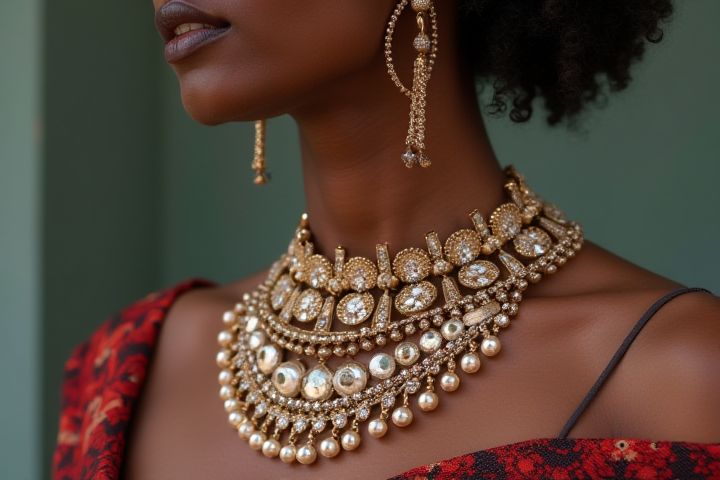
Fashion in Nigeria showcases a vibrant blend of traditional and contemporary styles, reflecting the nation's rich cultural heritage. The use of colorful fabrics such as Ankara and Aso Oke is common, embodying regional identities and celebrations. Designers like Deola Sagoe and Lisa Folawiyo have garnered international recognition, contributing to the global fashion scene with unique African aesthetics. Nigerian fashion events, like Lagos Fashion Week, play a crucial role in promoting local talent and innovative trends while attracting global attention. As you explore Nigerian fashion, you discover not just clothing choices, but a storytelling medium that conveys history, community, and identity.
Traditional attire significance
Traditional attire in Nigeria holds immense cultural significance, representing the diverse ethnic groups and their histories. Each region showcases distinct materials, patterns, and colors that reflect their unique identity; for instance, the vibrant Ankara prints are synonymous with contemporary Nigerian fashion. You can observe the rich symbolism in traditional garments, such as the Aso Oke from the Yoruba people, which is often worn during special ceremonies and signifies social status. Embracing traditional attire not only preserves cultural heritage but also promotes local craftsmanship and self-expression in today's fashion landscape.
Diverse cultural influences
Fashion in Nigeria draws inspiration from a rich tapestry of cultural influences, showcasing traditional attire alongside contemporary styles. Vibrant textiles such as Ankara and Aso Oke highlight the nation's craftsmanship and artistry, reflecting ethnic identities and regional heritage. Designers are increasingly blending modern techniques with historical motifs, creating unique garments that celebrate Nigeria's diversity. This fusion not only enhances your wardrobe but also serves as a canvas for storytelling, connecting wearers to their roots and cultural narratives.
Emerging fashion designers
Emerging fashion designers in Nigeria are redefining the landscape with their innovative styles and cultural inspirations. These creatives often blend traditional fabrics like ankara and aso-oke with contemporary designs, creating unique pieces that reflect both local heritage and modern aesthetics. Notable designers, such as Lisa Folawiyo and Orange Culture, are gaining international recognition, showcasing Nigerian craftsmanship at global fashion weeks. You can support this vibrant industry by exploring their collections, which often emphasize sustainability and ethical production.
Vibrant textile patterns
Fashion in Nigeria is characterized by vibrant textile patterns that reflect the country's rich cultural heritage. Traditional fabrics such as Ankara, Aso Oke, and Kente boast intricate designs and bold colors, showcasing artistic craftsmanship. Designers often incorporate these materials into contemporary styles, blending traditional aesthetics with modern silhouettes. By embracing Nigeria's diverse ethnic influences, you can experience a unique fashion landscape that celebrates creativity and individuality.
Nigerian fashion weeks
Nigerian fashion weeks serve as vibrant platforms showcasing the country's rich cultural heritage and contemporary styles, attracting local and international designers. Prominent events like the Lagos Fashion Week and Arise Fashion Week feature innovative collections that celebrate traditional fabrics such as Ankara and Adire, while also embracing modern silhouettes. These events not only highlight emerging talents but also promote sustainable fashion practices and the use of indigenous craftsmanship. Your understanding of Nigerian fashion is incomplete without recognizing the influence of social media, which amplifies trends and connects designers with a global audience.
Global impact and recognition
Nigerian fashion thrives on a rich tapestry of cultural heritage, blending traditional craftsmanship with contemporary design to create globally recognized brands. Influential designers such as Oprah Okafor and Lisa Folawiyo have gained international acclaim by showcasing colorful prints and intricate beadwork that celebrate African identity. Fashion weeks in Lagos, notable for their vibrant showcases, attract international buyers, influencers, and media, fostering a robust connection between Nigerian creatives and global markets. You can discover a unique blend of fashion statements that tell compelling stories, positioning Nigeria as a key player in the global fashion industry.
Fusion of modern and traditional styles
Nigerian fashion showcases a vibrant fusion of modern and traditional styles, reflecting the rich cultural heritage and contemporary influences present in the country. Designers often incorporate traditional fabrics like Ankara and Aso Oke into modern silhouettes, creating unique garments that celebrate both history and innovation. Events such as Lagos Fashion Week highlight this dynamic blend, featuring designers who prioritize sustainability and ethical practices alongside authentic cultural expressions. Your wardrobe can embrace this exciting trend by selecting pieces that combine classic prints with cutting-edge designs, allowing you to express your individuality while honoring Nigeria's artistic legacy.
Use of Ankara fabric
Ankara fabric, a vibrant printed cotton material, plays a central role in Nigeria's contemporary fashion scene, celebrated for its colorful patterns and cultural significance. Designers and tailors utilize Ankara to create a variety of garments, including dresses, skirts, and suits, reflecting both traditional and modern styles. The fabric's versatility allows for creative expression in casual and formal wear, making it a staple in Nigerian wardrobes. By incorporating Ankara into your fashion choices, you embrace a rich heritage while showcasing individuality and artistry.
Role in social and ceremonial events
Fashion in Nigeria plays a pivotal role in social and ceremonial events, reflecting rich cultural heritage and diverse ethnicities. Traditional attires, such as the beautifully patterned Aso Oke and vibrant Ankara fabrics, are often worn during weddings, festivals, and religious ceremonies, highlighting the importance of community and identity. You may notice that specific styles and colors are chosen to signify one's status, tribe, or occasion, creating a visual language that resonates deeply with the people. As fashion continues to evolve, Nigeria's contemporary designers are merging traditional aesthetics with modern trends, enriching the global fashion landscape while preserving cultural significance.
Influence of Nollywood fashion
Nollywood fashion significantly influences contemporary Nigerian style, showcasing vibrant colors, intricate patterns, and bold designs that reflect the country's rich cultural heritage. Iconic movies often feature traditional attire, such as agbada and aso ebi, which inspire both local and global fashion trends. The integration of local textiles like Ankara enhances identity, as designers blend modern aesthetics with ancestral artistry. You can see this impact in everyday wear, red carpet events, and fashion shows, cementing Nollywood's role as a driving force in Nigeria's fashion landscape.
